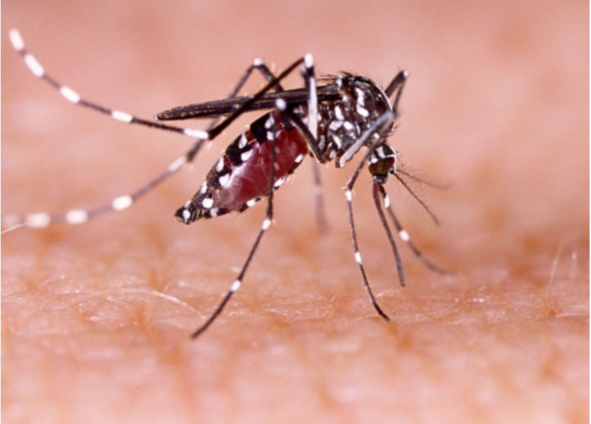Health experts in the Eastern Region are making concerted efforts to contain the outbreak of Dengue Fever following the detection of nine cases in various districts.
The Ghana Health Service (GHS) has issued an alert, and measures are being implemented to treat those affected and prevent further spread.
Health experts, led by the Eastern Regional Director of Health, Dr. Winfred Ofosu, are holding an emergency review meeting to strategise on curbing the outbreak.
Read also: Ghana Health Service issues alert on Dengue Fever outbreak
In an interview with JoyNews, Dr. Ofosu mentioned that residents in the affected districts are being sensitised.
Dr. Ofosu also advised residents to wear protective clothing when going to the farm to avoid being bitten by mosquitoes and to seek medical care if they are unwell.
"We are engaging the community members, opinion leaders, district assemblies, traditional leaders to inform them about the symptoms and also educate them on preventive and control measures," he said.
Additionally, the Director of Public Health with the GHS, Dr. Franklin Asiedu Bekoe, stated that steps are being taken to address the issue and urged the public to understand that not every fever is malaria, discouraging self-medication.
"For now, it is a localized outbreak and we are having community engagement," he noted.
Overview of Dengue Fever: According to the World Health Organization (WHO), dengue is a viral infection transmitted to humans through the bite of infected mosquitoes.
Approximately half of the world's population is at risk, with an estimated 100–400 million infections occurring annually. Many dengue infections are asymptomatic or cause mild illness, but the virus can occasionally lead to severe cases and even death.
Danger and Prevention: Dengue is particularly dangerous because its prevention and control depend on vector control. There is no specific treatment for dengue or severe dengue. Early detection and proper medical care significantly reduce the fatality rates of severe dengue. Most people infected with dengue will not show symptoms, but common symptoms include high fever, headache, body aches, nausea, and rash.
Recovery typically occurs within 1–2 weeks, but severe cases may require hospitalization and can be fatal. The risk of dengue can be lowered by avoiding mosquito bites, especially during the day.
Symptoms of dengue fever include:
- High fever
- Severe headache
- Pain behind the eyes
- Muscle and joint pains
- Nausea
- Vomiting
- Swollen glands
- Rash
Latest Stories
-
Mahama’s gift-giving code lacks clarity and encourages double standards – Transparency Int’l Ghana
13 minutes -
Dreams FC: Shy Winfred Dormon remains tightlipped on interest in head coach role
16 minutes -
Supreme Court to hear another suit seeking to halt removal proceedings against CJ today
34 minutes -
Sammy Gyamfi lists 3 key NDC interventions behind Cedi appreciation
36 minutes -
Thousands of students register for ‘No Fees Stress’ reimbursement scheme – Kwakye Ofosu
53 minutes -
UTAG-UG slams Auditor-General for denying UG management the right of response to ‘damning’ report
57 minutes -
Telecel Group strengthens commitment to Ghana’s socio-economic development with major CSR initiative in digital skills training
2 hours -
Telecel Ghana honours Epixode with Music for Good Award at 26th TGMAs
2 hours -
Eddie Nketiah scores twice in Crystal Palace win over Wolves
2 hours -
The Pelican Hotel in Cantonments unveils a new era of hospitality
2 hours -
Mpohor and Adum Banso in the Western Region welcome 20 Blue Water Guards
2 hours -
Softcare celebrates Mother’s Day with donation to Korle-Bu Teaching Hospital
2 hours -
Monetary Policy Committee of BoG begins meeting today; cedi performance high on the agenda
3 hours -
itel debuts CITY series with CITY 100 new model: A stylish, durable & DeepSeek AI-powered smartphone for Gen Z
3 hours -
Star Assurance, Hope for Little Lives deliver transformative outreach
3 hours

